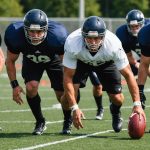Overview of Psychological Strategies in Sports
Psychological strategies in sports are essential tools that enhance athletes’ performance and well-being. These strategies include mental skills and techniques such as visualization, self-talk, goal-setting, and focus enhancement. By developing an athletes’ mindset, these approaches aim to boost confidence, manage anxiety, and sharpen concentration during competition.
Mental preparation is fundamental for athletes, enabling them to cope with pressure and perform at their best. It involves routines that athletes use before entering the field, helping to create a winning mentality. Success is not solely dependent on physical ability; mastering mental skills is equally crucial.
In the same genre : Exploring the Impact of Cultural Diversity on Team Dynamics in Global Sports Teams
The use of psychological strategies varies across individual versus team sports. In individual competitions, athletes often focus on intrinsic motivation and self-regulation since they rely extensively on personal performance and mindset. Conversely, in team sports, strategies may include promoting cohesion, communication, and unity, as team dynamics directly influence overall success.
Understanding and utilizing these strategies can empower athletes to handle a variety of scenarios, making them resilient against the pressures of high-stakes competition. By doing so, athletes can maintain peak performance levels, regardless of the nature of the sport they engage in.
Additional reading : Exploring the Impact of Cultural Diversity on Team Dynamics in Global Sports Teams
Psychological Strategies for Individual Sports
The arena of individual sports demands unique mindsets and preparation techniques for success. A solo athlete’s preparation focuses intensively on mental resilience and psychological strategies tailored to solo performance dynamics.
Key Techniques for Mental Preparation in Individual Sports
Visualization and imagery techniques can enhance an athlete’s focus and execution by mentally rehearsing success scenarios. Such techniques precondition the mind to adapt seamlessly in high-pressure situations, effectively priming the athlete for competition.
Goal setting and self-motivation strategies serve as the roadmap and fuel for solo athletes. Crafting specific, measurable, achievable, relevant, and time-bound (SMART) objectives can drive consistent improvement, while maintaining motivation is crucial for pushing past plateaus and setbacks.
Staying focused and managing anxiety are critical components as well. Techniques such as mindfulness, deep-breathing exercises, and progressive muscle relaxation aid in maintaining composure, reducing stress, and honing concentration during pivotal moments.
Case Studies of Successful Individual Athletes
Prominent athletes like Roger Federer use a blend of mental strategies tailored to personal strengths and weaknesses. Psychological assessments depict their ability to stay calm under intense pressure and utilize mindset techniques to maintain competitive edge.
Expert Opinions on Individual Sports Psychology
Sports psychologists advocate for developing a robust mental framework that fosters resilience, with recommended practices such as personal performance analysis and mental conditioning drills being paramount for aspiring solo competitors.
Psychological Strategies for Team Sports
Understanding the collective dynamics and the intricate nature of team sports requires implementing strategies that enhance mental resilience and cooperation among players.
Group Mentality and Cohesion in Team Sports
The essence of successful team sports lies in fostering robust team cohesion and effective communication. When team members trust and understand each other, they perform more efficiently and harmoniously. To build this trust and unity, teams can incorporate activities focused on open dialogue and mutual support, encouraging an environment where each member feels valued and understood. Enhancing group preparation through regular team-building exercises strengthens interpersonal bonds, creating a single-minded pursuit of shared goals.
Performance Under Pressure in Team Settings
High-stakes competitions can trigger anxiety, but effective stress management techniques are crucial for maintaining composed performance. Strategies such as visualization and positive self-talk can alleviate tension. Leadership plays a pivotal role by instilling confidence and providing reassurance. Support systems, including coaches and peers, contribute to a stable and encouraging environment, vital for maintaining peak performance during critical moments.
Expert Insights on Team Sport Psychology
Psychologists specializing in team dynamics offer valuable insights into group preparation and mental toughness. Integrating best practices for mental toughness, such as role-playing scenarios and focusing on controllable aspects, enhances a team’s competitive edge. These expert perspectives emphasize resilience, fostering a collective mentality that thrives under pressure.
Comparative Analysis of Individual vs. Team Sports
Understanding the psychological differences between individual and team sports is crucial for athletes’ mental preparation. Individual sports require athletes to be solely responsible for their performance, often leading to a more independent mental training process. In contrast, team sports emphasize collective strategies, fostering a sense of community and shared responsibility.
The comparison of sports strategies showcases significant differences in mental preparation. Individual athletes might focus on personal goal-setting and self-motivation since their performance directly affects the outcome. On the other hand, team sports demand cohesion, requiring mental training that nurtures communication and mutual support.
Examining the pros and cons of psychological strategies across these sports reveals essential insights. Independent athletes develop high self-reliance, often enhancing personal resilience. However, they might lack the psychological support found in team environments. Conversely, athletes in team sports benefit from shared stress and collaboration but may struggle with internal dynamics and conflicting personalities.
Ultimately, the type of sport significantly impacts psychological resilience. Individual sports athletes face unique pressures, leading to toughness and adaptability. Team athletes, while sharing the emotional load, must remain resilient within the dynamics of teamwork. Thus, understanding the most effective approaches to mental training is essential for athletes, whether they compete alone or as part of a team.
Practical Tips for Athletes in Both Sports
Embracing effective mental training tips alongside athlete advice can be a game-changer for those striving to elevate their performance. Solid preparation strategies are essential to develop a personal mental preparation plan that suits your unique athletic needs.
Developing a Personal Mental Preparation Plan
Creating an individualized mental training routine begins with identifying your specific goals and challenges. Integrate both individual and team strategies to form a comprehensive approach. Start by:
- Setting clear objectives for mental growth.
- Incorporating visualization techniques and mindfulness exercises.
- Regularly evaluating and adjusting your plan for continuous improvement.
Resources and Tools for Mental Preparation
Utilize a variety of resources, such as recommended books, apps, and exercises designed to enhance mental resilience. Engaging in workshops and training programmes focused on mental coaching can further bolster your psychological readiness. Some top resources include:
- Books focused on sports psychology.
- Mobile apps that offer guided meditations and mental exercises.
Building a Support System for Mental Fitness
A robust support network is fundamental for mental fitness. Surround yourself with mentors and peers who understand your journey. Strategies to strengthen your support system include:
- Joining athlete communities for shared experiences.
- Seeking mentors who offer guidance in both personal and professional growth.
By implementing these strategies, athletes can enhance their mental readiness and overall performance.













